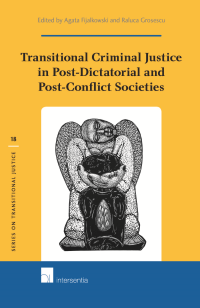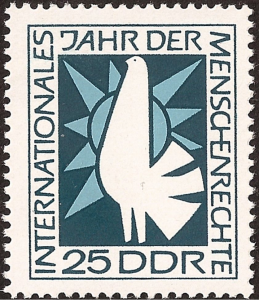Human Rights after 1945 Conference Report Published
Posted on 29 June, 2016 in1989 after 1989 Eastern Europe Globalisation Human Rights Post Socialism Rethinking 1989 Socialism

The conference Human Rights after 1945 in the Socialist and Post-Socialist World took place on the 3 – 5 March 2016 at the German Historical Institute, Warsaw. It was a collaborative conference between 1989 after 1989; the German Historical Institute Warsaw; Georg-August University of Göttingen and the London School of Economics. The aim of the conference was to highlight the role and historical agency of the socialist world in the history of human rights.
The conference report is now available on our conference pages and on Geschichte Transnational. It summarises papers presented across 6 panels covering topics such as state socialism, human rights and globalisation; how human rights is defined internationally; state socialist conceptualisation of rights and human rights; socialist foreign policy; transnational movements and flows; and political dissent in relation to the global history of human rights.
The importance of analyzing vernacular human rights, i.e. analyzing when and how people used human rights languages [5], was one of the leitmotifs of the conference. The issue of teleology and normativity in historical human rights research was another major topic. Consequently, many papers presented stories of failures that contradict positivist narratives and challenge policy-orientated narratives of democratic transition. Parallel to transnational and international human rights history, the role of the state in human rights history was another key issue of the conference. Bringing the state back in, human rights can also be seen as an element of legal history – a promising approach embedding the highly normative notion of human rights in a wider legal history context. This conference brought together scholars working on various regions and actors in a truly fruitful manner. It linked different approaches and perspectives on the history of human rights in a way that contributed to an urgently needed, more complex understanding of the socialist world’s role in human rights history.
Read the full conference report.
Human Rights after 1945 in the Socialist and Post-Socialist World Conference Programme
Posted on 29 February, 2016 in1989 1989 after 1989 Cold War Globalisation Human Rights Socialism

March 3-5, 2016
German Historical Institute Warsaw
Conference Room, 3rd Floor
Organizers:
German Historical Institute Warsaw
1989 after 1989: Rethinking the Fall of State Socialism in Global Perspective
Georg-August University of Göttingen
Synopsis
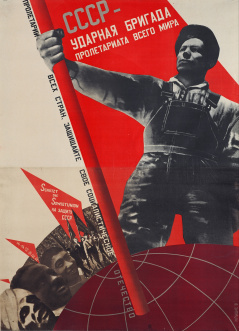 As both human rights and globalization have emerged as dynamic fields of historical and sociological research, the “socialist world” is relegated to a supporting role in the triumph of Western capitalism and liberal democracy. The aim of this conference is to question established narratives that have ignored or downplayed the role of socialist ideas, practice, and experts—be they state officials, loyal intellectuals or dissident activists — in the development of international human rights ideas, discourses, and systems in the post-war era. With a geographic scope that covers the Soviet Union, the Eastern Bloc, Yugoslavia and China, we hope to show that the socialist world did not just react passively to Western human rights politics, but was a vital participant in the production of global human rights with legacies that continued past the revolutions of 1989. By examining the socialist contribution to the evolution of human rights, we hope to contribute to revising standard narratives of globalization that focus exclusively on the perceived winners of these processes.
As both human rights and globalization have emerged as dynamic fields of historical and sociological research, the “socialist world” is relegated to a supporting role in the triumph of Western capitalism and liberal democracy. The aim of this conference is to question established narratives that have ignored or downplayed the role of socialist ideas, practice, and experts—be they state officials, loyal intellectuals or dissident activists — in the development of international human rights ideas, discourses, and systems in the post-war era. With a geographic scope that covers the Soviet Union, the Eastern Bloc, Yugoslavia and China, we hope to show that the socialist world did not just react passively to Western human rights politics, but was a vital participant in the production of global human rights with legacies that continued past the revolutions of 1989. By examining the socialist contribution to the evolution of human rights, we hope to contribute to revising standard narratives of globalization that focus exclusively on the perceived winners of these processes.
Conference Programme
Thursday, 3 March 2016
14:00-14:30
Welcoming Address
Ruth LEISEROWITZ (German Historical Institute Warsaw)
14:30-15:30
Introductory Panel: State Socialism, Human Rights and Globalization: In Search of a New Narrative
Hella DIETZ (Georg-August University of Göttingen)
Ned RICHARDSON-LITTLE (University of Exeter)
Robert BRIER (London School of Economics)
15:30-16:00 Coffee break
16:00-18:00
Panel 1: Defining Human Rights Internationally
Steven JENSEN (Danish Institute for Human Rights)
Defining the Social in the Global: Social Rights, UN Diplomacy and the Emergence of International Non-Discrimination Norms and Politics, 1950-1960
Alexander OSIPOV (European Centre for Minority Issues)
The Soviet Union’s Involvement in the Establishment of the European Minority Rights Regime
Discussant: Arnd BAUERKÄMPER (Free University Berlin)
19:00 Conference Dinner
Friday, 4 March 2016
09:00-11:00
Panel 2: State-Socialist Conceptions of Rights and Human Rights
Jennifer ALTEHENGER (King’s College London)
Rights, Not Human Rights: Communist China’s National Constitution Discussion, 1954
Michal KOPEČEK (Institute for Contemporary History, Prague and Charles University, Prague)
Socialist Conceptions of Human Rights and its Dissident Critique
Todor HRISTOV (University of Sofia)
Rights to Weapons: Human Rights as a Resource in Workplace Conflicts in Late Socialist Bulgaria
Discussant: Paul BETTS (Oxford University)
11:00-11:30 Coffee Break
11:30-13:00
Panel 3: Tolerance, Difference, and Rights under Socialism
Ivan SABLIN (University of Heidelberg)
Illusive Tolerance: Buddhism in the Late Soviet State
Zhuoyi WEN (Hong Kong Institute of Education)
Contesting Cultural Rights in Post-socialist China
Discussant: tba
13:00-14:30 Lunch break
14:30-16:00
Panel 4: Human Rights as Socialist Foreign Policy
Sebastian GEHRIG (Oxford University)
The Fifth Column of the Third World? The East German Quest for International Recognition through UN Rights Discourses
Jens BOYSEN (German Historical Institute Warsaw)
Polish Engagement in the United Nations as a Tool for Justifying Communist Rule in Poland and Gaining Leeway in the Warsaw Pact
Discussant: Robert BRIER
(London School of Economics)
16:00-16:30 Coffee Break
16:30-18:00
Panel 5: Transnational Movements and Flows
Christie MIEDEMA (University of Amsterdam)
Negotiating Space for International Human Rights Activism: Amnesty International in Eastern Europe before 1989
Rósa MAGNÚSDÓTTIR (University of Aarhus)
Soviet-American Intermarriage: Transnational Love and the Cold War
Discussant: James MARK (University of Exeter)
19:00 Dinner for the conference participants
Saturday, 5 March 2016
9:00-11:00
Panel 6: Dissent and Human Rights
Simone BELLEZZA (University of Eastern Piedmont)
The Right to Be Different: Ukrainian Dissent and the Struggle Against a Global Consumerist Cultural Standardization
Hermann AUBIÉ (University of Turku)
Between Loyalty and Dissent: Revisiting the History of Human Rights in China Through the Discourse of Chinese Intellectuals and Dissidents
Zsófi a LÓRÁND (European University Institute, Florence)
Feminist Dissent, Activism for the Elimination of Violence against Women, and the Human Rights Discourse in Yugoslavia in the 1970s-1980s
Discussant: Celia DONERT (University of Liverpool)
11:00-11:30 Coffee Break
11:30-13:00
Concluding Panel: The Place of State Socialist Societies in the Global History of Human Rights
Paul BETTS (Oxford University)
James MARK (University of Exeter)
Celia DONERT (University of Liverpool)
Call for Papers: Human Rights after 1945 in the Socialist and Post-Socialist World
Posted on 12 October, 2015 in1989 after 1989 Communism Globalisation Human Rights Post Socialism Socialism

German Historical Institute, Warsaw
March 3 – 5, 2016
Call for Papers Deadline: 27 November 2015
Human Rights after 1945 in the Socialist and Post-Socialist World
Histories of late twentieth century global change have focused on its perceived winners on a macro-scale: democratic capitalism, global markets and individual rights. In such formulations, the “socialist world” and its history appear irrelevant to understanding global processes and unable to inform liberal Western democratic societies.
The global rise of human rights might look like a particularly striking case in point. The formal guarantees of rights in socialist societies, after all, seemed to have no substantial effect on these societies’ political and legal practices, and the debate on civil society in “the West” which east European human rights activists had inspired during the 1980s, did not survive socialism’s fall in that region.
In this conference, we want to question those narratives. Actors from the socialist world – be they state officials, loyal intellectuals or dissident activists – actively participated in international conflicts over the meaning of democracy, economic freedom, religious liberty and national self-determination in the post-war period. Socialist officials took part in drafting the U.N. covenants of 1966, in turning South African apartheid or repression in Chile into global causes célèbres or in promoting women’s rights. African socialists shaped human rights discourses by blending them with the struggle for self-determination, while Latin American activists grafted human rights to their Marxist ideas. Chinese Communists joined traditional ideas of cultural difference with Leninist ideology to create a distinct human rights discourse. Dissident intellectuals, on the other hand, did not necessarily take the West’s side in the Cold War when they criticized socialist realities, but developed innovative human rights vernaculars deeply shaped by their unique contexts. In sum, the “socialist world” did not just react passively to Western human rights politics, but was a vital participant in the story of the production of global human rights.
This conference seeks to explore how the socialist world can be written into the broader global narratives of the rise of human rights in the 20th century, and even revise these narratives. Our understanding of the “socialist world” is deliberately inclusive. It entails the socialist systems of eastern Europe, Eurasia, Africa, Southern and East Asia as well as socialist and Communist parties and movements more broadly, and anti-colonial or anti-dictatorial movements in the Global South.
We welcome papers from different disciplines and from diverse perspectives, whether dealing with official discourses, state policies, right experts, or national or transnational political movements.
We particularly encourage proposals on the following topics:
- rights cultures within socialist societies, including reflections on the global context of their construction;
- the contribution of socialist elites, experts and social groups to the global rise of human rights;
- connections across the socialist world in the production of conceptions of rights, including reflections on the role of international organizations or transnational movements;
- the importance of rights discourses for socialist regimes and movements in establishing legitimacy at home and abroad;
- the use of rights discourses by opposition movements, and the relationship between official/ alternative rights movements within socialist societies;
- the legacy of rights discourses within socialist and post-socialist societies today;
- comparisons, and connections between, the production of rights ideas in the socialist and non-socialist worlds;
- rethinking the role of rights and the collapse of socialist states;
- broader reflections on writing the socialist world into the history of rights;
- broader reflections on how these stories contribute to the rethinking of the story of cultural and political globalization.
This conference is the first in a series of meetings exploring how processes and practices that emerged from the socialist world shaped the re-globalized world of our times. Throughout, the legacies of this socialist engagement with globalising processes in the socialist and post-socialist world will also be an important point of interest.
Please send a brief abstract of 300-500 words, as well as a brief CV, by November 27, 2015, to Natalie Taylor at the University of Exeter (N.H.Taylor@exeter.ac.uk ). All organizational questions can be sent to Natalie Taylor. Academic queries should be sent to Hella Dietz (Hella.Dietz@sowi.uni-goettingen.de ).
Download the Call for Papers: Call for Papers Human Rights after 1945
Substantial funding opportunities for travel and accommodation are available, but we ask that potential contributors also explore funding opportunities at their home institutions.
This event is kindly supported by the German Historical Institute in Warsaw and the Leverhulme Trust-funded project 1989 after 1989: Rethinking the Fall of State Socialism in Global Perspective at the University of Exeter.
[Top]1989 after 1989 Research Fellow Awarded Fritz Stern Dissertation Prize
Posted on 9 December, 2014 in1989 after 1989 Human Rights

Many congratulations to our Research Fellow, Dr Ned Richardson-Little, on being awarded the prestigious 2014 Fritz Stern Dissertation Prize.
He received the award at the 23rd Annual Symposium of the Friends of the German Historical Institute in Washington DC last month, where Richardson-Little also spoke about his dissertation and his research.
 His PhD dissertation: Between Dictatorship and Dissent: Ideology, Legitimacy and Human Rights in East Germany, 1945-1990 (Ph.D. dissertation, University of North Carolina at Chapel Hill, 2013) was praised by the German Historical Institute (GHI) for being an “intellectually challenging and beautifully written study of human rights politics in the German Democratic Republic”. The GHI also commended his work for it’s significant and timely contribution to both historiography on modern Germany and the emerging scholarship on human rights.
His PhD dissertation: Between Dictatorship and Dissent: Ideology, Legitimacy and Human Rights in East Germany, 1945-1990 (Ph.D. dissertation, University of North Carolina at Chapel Hill, 2013) was praised by the German Historical Institute (GHI) for being an “intellectually challenging and beautifully written study of human rights politics in the German Democratic Republic”. The GHI also commended his work for it’s significant and timely contribution to both historiography on modern Germany and the emerging scholarship on human rights.
The GHI’s prize citation reads:
Edward Richardson-Little’s dissertation, “Between Dictatorship and Dissent: Ideology, Legitimacy, and Human Rights in East Germany, 1945-1990,” is an intellectually challenging and beautifully written study of human rights politics in the German Democratic Republic. Upon learning that leaders and supporters of the ruling Sozialistische Einheitspartei Deutschlands (SED) often invoked human rights, one might be tempted to imagine this practice as a cynical use of rhetoric by a dictatorial government to combat a rival Western vision of democracy and capitalism. However, Richardson-Little persuasively demonstrates that the SED and its supporters convinced many religious leaders, intellectuals, and working class supporters that socialism supported an indigenous brand of human rights superior to the individualistic, liberal version offered by the West. Richardson-Little makes excellent use of a wide range of sources from fourteen German archives to argue that, not only was there a thriving debate about human rights in East Germany, but also that citizens used that discourse to express dissent. Quite early, the SED developed its own Marxist conception of human rights to criticize the West, including the dangers of Western imperialism. The East German regime encouraged its citizens to believe that there could be “no human rights without Socialism.” The SED established a Committee for Human Rights, argued for human rights solidarity in the Third World, and used human rights as a basis for international agreements with the West. By the mid-1980s the discourse of human rights fostered by the SED provided peace activists, environmentalists, and advocates of democracy a powerful tool to oppose East German policies as well. The strength of their arguments helps explain the speed of revolutionary impulses by 1989. The SED’s use of human rights discourse, Richardson-Little demonstrates, played a critical role in legitimizing its own downfall. The topic of human rights has received a great deal of scholarly attention from recent historians, largely as part of narratives of the spread of Western values. However, as Richardson-Little points out, contradictions between a rhetoric of human rights and political policies that violate those rights characterized Western powers as well. Historians should be no less willing to accept that contemporaries in East Germany could value human rights, even if their envisioned path to achieving those rights varied significantly from their Western counterparts. In the face of continued debates about the limits of the West’s commitment to human rights, Richardson-Little’s Between Dictatorship and Dissent thus makes a significant and timely contribution, both to the historiography on modern Germany and to the emerging scholarship on human rights.
Richardson-Little will now continues his research with the 1989 after 1989 project at the University of Exeter, where he seeks to complicate the triumphalist narratives of good inevitably overcoming evil, ushering in a unified global human rights culture, by examining the complexity and plurality of human rights in late socialism and the post-socialist world. More information on Dr Richardson-Little research can be found here.
[Top]Transitional Criminal Justice in Post-Dictatorial and Post-Conflict Societies
Posted on 3 December, 2014 in1989 after 1989 Human Rights Transitional justice

Raluca Grosescu‘s co-edited volume “Transitional Criminal Justice in Post-Dictatorial and Post-Conflict Societies” is now available as part of Intersentia’s Series on Transitional Justice.
Edited alongside Agata Fijalkowski, a Senior Lecturer in Law at Lancaster University, the volume considers the important and timely question of criminal justice as a method of addressing state violence committed by non-democratic regimes. Its main objectives concern a fresh, contemporary, and critical analysis of transitional criminal justice as a concept and its related measures, beginning with the initiatives that have been put in place with the fall of the Communist regimes in Europe in 1989.
The collection argues for a re-thinking and re-visiting of filters scholars use to interpret the main issues of transitional criminal justice. Such things as: the relationship between judicial accountability, democratisation and politics in transitional societies; the role of successor trials in re-writing history; the interaction between domestic and international actors and specific initiatives in shaping transitional justice; and the paradox of time in enhancing accountability for human rights violations. In order to accomplish this, the volume considers cases of domestic accountability in the post-1989 era, from different geographical areas, such as Europe, Asia and Africa, in relation to key events from various periods of time. In this way the approach, which investigates space and time-lines in key examples, also takes into account a longitudinal study of transitional criminal justice itself.
Transitional Criminal Justice in Post-Dictatorial and Post-Conflict Societies will be available from Intersentia as part of their Series on Transitional Justice.
[Top]‘Death to fascism, freedom to expression!’ – The Post-Yugoslav Media and Freedom of Speech
Posted on 3 November, 2014 in1989 after 1989 End of Yugoslavia Human Rights

By Ljubica Spaskovska
The transition to democracy should have liberated the media in the former Yugoslav states, but in many ways the situation has actually gotten worse.
‘In these times/when everything is silent/In these times/I say – freedom/ And I see fear…’
This verse from the song entitled ‘Freedom’ is one of the tracks from an album by the Macedonian band ‘Reporters’ made up exclusively of journalists of different ethnic backgrounds. Under the slogan ‘Solidarity for freedom’, the Independent trade union of journalists and media workers, with the support of the US Embassy launched a campaign meant to incite a debate on freedom of speech, on the state of the media in Macedonia and solidarity among journalists. Over the past few weeks, both Macedonia’s and Serbia’s Independent Journalists’ Associations (members of the International Federation of Journalists) have raised concerns about similar phenomena through calls for a public hearing on media freedom or through the organisation of debates, conferences and concerts.
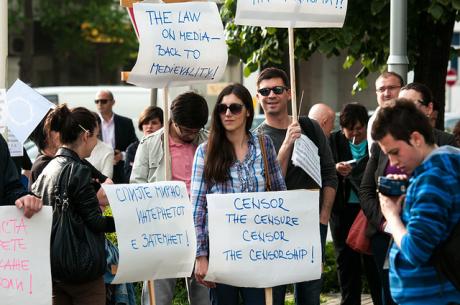
Indeed, the 2014 EU progress reports for all of the post-Yugoslav states aspiring to EU accession (Bosnia-Herzegovina, Montenegro, Serbia, Kosovo, Macedonia) underline a trend of serious deterioration of media freedom. Almost quarter of a century after the disintegration of Yugoslavia and the introduction of electoral, multi-party democracy, these societies have been witnessing a progressive narrowing down of public, intellectual and media spaces for free debate and reporting. Political and financial pressures, intimidation and threats against journalists and editors in Bosnia, self-censorship, threats and violence against journalists in Serbia, Montenegro and Kosovo, and government influence on media exercised through state-financed advertising in Macedonia have been observed in a context of a scarcity of real commitment on the part of political elites to tackle this problem and take the recommendations from the progress reports seriously.
Over the years, different governments have managed to blur the line between the ruling party/coalition and the state and to deprive state institutions of their independence. Moreover, they have turned an increasing number of media outlets into channels for dissemination of their political ideology or attacks on political opponents. For instance, the State Department Macedonia Country Report on Human Rights Practices for 2013 noted that members of the Association of Journalists of Macedonia reported pressures ‘to adopt a pro-government viewpoint in their reporting or lose their jobs.’
In Macedonia, further grievances were aroused by the detention and conviction of journalist Tomislav Kežarovski for revealing the identity of a protected witness in a story written in 2008. Civil society activists, local journalist associations and opposition leaders have constantly referred to reports by international bodies and governments that had condemned the trial and Kežarovski’s imprisonment in order to give legitimacy to their protest, albeit to little avail.
Moreover, the State Department Country Report lists Kežarovski’s case in the section entitled ‘Political Prisoners and Detainees’. The OSCE Representative for the Freedom of the Media, as well as the European Federation of Journalists similarly condemned the long sentence. Hence, it comes as no surprise that in the 2014 World Press Freedom Index Macedonia sits in 123rd place and has never been so low in the Index (the lowest in comparison to the other former Yugoslav states).
However, the state of the media is only a symptom of wider societal phenomena such as growing intolerance toward ‘oppositional’ voices and certain frozen narratives which seek to uncritically glorify the nation, the state, the ruling ideology and demonize the socialist/Yugoslav past. Croatia and Slovenia are the only two former Yugoslav republics which are members of the European Union. Although considerably higher on the World Press Freedom Index, neither Slovenia nor Croatia have been immune to the (re)establishment of a certain dogmatism in interpreting or discussing about the past.
A case in point is the recent decision of Croatian President Ivo Josipović to fire his main analyst professor Dejan Jović for an article in the academic journal Political Thought. Entitled ‘Only in myths every nation desires its own state’ and comparing the Scottish independence referendum and the Yugoslav referenda of the early 1990s, Jović argued that the latter were illiberal and did not allow for a genuine debate and consideration of all political opinions and visions for Yugoslavia’s future.
Similarly, the MPs of the conservative Slovenian Democratic Party (SDS) proposed a dismissal of the president of the Slovenian national assembly Dr. Milan Brglez for qualifying Yugoslavia in an interview as a state that had credibility and prestige in the international community and that the Slovenian independence in that sense was a step backwards.
Why, a quarter of a century after the first multi-party elections in the former Yugoslavia, are there still certain dogmatic ‘truths’ in most of the successor states, where freedom of expression is not an accomplishment, but, rather, something yet to be realised?
An obvious reason which is often evoked as the main factor is the socialist past itself. However, this can only offer a partial explanation and it could be counter-productive, as it fails to put the burden of responsibility on contemporary policy-makers and elites. Moreover, from 1950 practices of pre-censorship had been abolished in socialist Yugoslavia. It was the public prosecutor who could act only ex-post facto, after a broadcast, publication or film presentation. By the mid-1980s, the Yugoslav media network was significantly fragmented, decentralised, yet numerically impressive.
In 1987, Yugoslavia had 2,825 newspapers and 202 radio and TV stations. Hence, it was virtually impossible to sanction all acts which were classified as ‘verbal crime’ under the notorious ‘Article 133’ which criminalised acts of ‘hostile propaganda’, but was also meant to curb nationalist discourse, channelling what Lenard Cohen identified as ‘Yugoslav communism’s strong antipathy to overt nationalist tactics’.[1] Moreover, the 1980s saw the reinvigoration of the debate on freedom of speech and on the abolishment of the verbal crime. Although restrained, debate did occur in different fora.
For instance, in 1981 the president of the Federal Court in an article in a law journal acknowledged that the formulation of ‘Article 133’ was not precise, while at the 1983 conference of Yugoslav criminologists several professors of law called for the repeal of the article.[2] Several years later, as a young journalist in one of the principal magazines of the League of Socialist Youth, Dejan Jovic argued that the organisation (which in fact financed the magazine) should be abolished [3]. Back then, he was not sacked for his opinion.
Twenty-five years later, both old and new generations of journalists, intellectuals, students and activists are fighting battles which would have normally belonged to a distant past. When on 9 May last year, on the occasion of Europe Day, representatives of the ‘Front for Freedom of Expression’ gathering a number of civil society organizations and initiatives staged a protest in front of the seat of the delegation of the European Union to Macedonia, they chose as their slogan a creative remake of an old motto of the partisan resistance movement: ‘Death to fascism, freedom to expression!’.
References:
[1] Lenard Cohen, The Socialist Pyramid Elites and Power in Yugoslavia(Oakville/New York/London: Mosaic Press, 1989), p.445.
[2] Yugoslavia: Prisoners of Conscience (London: Amnesty International Publications, 1985), p.29.
[3] Dejan Jović, ‘Kad bi SSOJ postojao, trebalo bi ga ukinuti (1)’ Polet 402, 10.2.1989.
[Top]Writing Human Rights into the History of State Socialism
Posted on 24 March, 2014 in1989 after 1989 Human Rights

By Ned Richardson-Little
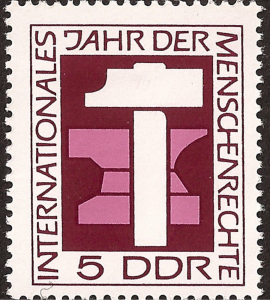
One of a number of East German postage stamps commemorating International Human Rights Year 1968. The hammer and anvil represent the right to work
The collapse of the Communist Bloc in 1989-1991 is viewed as one of the great triumphs of the human rights movement. But this ignores how socialist elites of the Eastern Bloc viewed themselves: not as the villains in the story of human rights, but as the champions.
In recent years, the rapidly expanding field of human rights history has done much to complicate triumphalist narratives of inevitable victory for Western liberal democracy over the forces of tyranny. Recent collections including those edited by Stefan-Ludwig Hoffmann, Jan Eckel and Samuel Moyn, have opened up new lines of inquiry exposing not only the contingency of these ideas, but also the conflicts amongst those claiming the mantle of universal human rights. On the Exeter University Imperial and Global History Centre blog in recent weeks, Fabian Klose has examined the important role of decolonization and post-colonial states in shaping the development of human rights politics, and Robert Brier has interrogated the idea of human rights as a product of neo-liberalism in the context of the Polish opposition. Here, I want to look beyond the human rights campaigns of dissident Eastern Europeans to that of the states they fought against.
While state socialism is normally seen as the definitional opponent of human rights – rejecting individual autonomy, independent justice, free elections, free speech and free practice of religion – the elites of the Eastern Bloc claimed that they were actually the true representatives of human rights. For them, the revolutionary victory over capitalism meant the end of class conflict and the abolition of the “exploitation of man by man.” The creation of a socialist society overcame the horrific abuses of the capitalist system, including war, imperialism and racism.
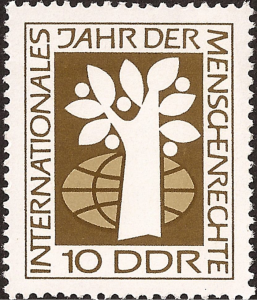
Another stamp commemorating International Human Rights Year 1968. The tree and globe represent the right to life
Eastern Bloc elites built upon Karl Marx’s denunciation of human rights rhetoric as a tool of the bourgeoisie to disguise their own class interests in the cloak of universal justice. They argued that while human rights were indeed a sham under capitalism, the socialist revolution had created a higher kind of human rights that allowed for real participation in all forms of political and economic life and achieved true equality across the class, race and gender lines. As the East German legal philosopher Karl Polak declared, “There can be no human rights without socialism!”[1]
When such rhetoric from the Eastern Bloc has been noted in histories of the Cold War, it is usually dismissed as a crude and cynical attempt to deflect Western criticism, particularly after the signing of the Helsinki Accords in 1975. That is, once the communist states were compelled to affirm the idea of human rights, they simply had to adjust their rhetoric in a desperate attempt to fend off protest from within and without.[2] These narratives are undermined, however, by the fact that state socialist elites were using the language of human rights well before Helsinki – the quote above from Karl Polak dates to 1946. In Hungary, the first scholarly work on human rights and socialism was written by legal scholar Imre Szabo in 1948.[3] As Jennifer Amos and Daniel Whelan have demonstrated, the Soviet Union was an active player in the human rights diplomacy of the 1950s. Such early efforts weren’t just rhetorical or academic: the German Democratic Republic formed the Committee for the Protection of Human Rights to campaign against abuses by the West and to mobilize citizens to campaign against the imprisonment of communists and peace activists in West Germany. Founded in 1959, this group predates the creation of Amnesty International by two years.
The 1970s are today seen as the turning point when international human rights exploded as a global movement, but at the beginning of the decade, it appeared to some observers that the West was simply outmatched by the Socialist Bloc. By 1968, the entirety of the Eastern Bloc had either signed or publically affirmed the UN’s International Covenant on Civil and Political Rights. While the United Kingdom, Italy, and West Germany did so early on, other Western countries lagged well behind with Canada signing in 1976, the USA in 1977 and France in 1980. In 1973, one observer from West Germany concluded,
With the change in majorities in the bodies of world organizations – particularly in the [UN] General Assembly – the socialist states have recognized the possibility of the politicization of human rights, and the free world has almost cleared off the field without a fight: the US by its human rights abstinence, the Western European countries by their regionalism.[4]
While the Helsinki Accords are now often portrayed as a coup for the West in “forcing” the East to accept terms that would eventually lead to its downfall, at the time, the idea of human rights was hardly seen as a devastating ideological weapon.
Including the perspective of state socialist leaders and elites is crucial to understanding human rights diplomacy in the post-war era. Such ideas and politics also were crucial to state socialist rule and influenced the development of dissident and opposition movements, as I have recently argued, along with Benjamin Nathans, Paul Betts, and Mark Smith and others. Celia Donert’s recent work similarly demonstrates how the explosion of women’s rights as human rights in 1990s can be in part traced back to the transnational feminism organized through Eastern Bloc organizations and events that have been dismissed as mere propaganda for communism. Rather than simply seeing the rise of human rights movements in the East as a direct importation from the West, this new scholarship shows how 1989 was also connected to the evolution of indigenous right cultures that were initially fostered by the state. This line of inquiry is not only valuable to the study of the Cold War and its end, but also to explaining the development of human rights politics in the post-socialist period.
In challenging liberal Western triumphalism, it is also vital to consider the perspectives of the socialist East. The appropriation of the idea of human rights by non-liberal and even dictatorial states is no relic of Cold War dynamics long since departed, but is continuing to this day in Iran and North Korea. In grappling with the developments of 1989, political scientist Peter Juliver argued that one had to begin a process of “rethinking rights without the enemy.” I would argue that in order to do so, we first must rethink the history of human rights including the “enemies,” and not just the victors.
[1] Karl Polak, “Gewaltteilung, Menschenrechte, Rechtsstaat: Begriffsformalismus und Demokratie,” Einheit 7 (December 1946): 138.
[2] For the main work asserting the discontinuous effect of Helsinki Accords for the Eastern Bloc, see Daniel Thomas, The Helsinki Effect: International Norms, Human Rights, and the Demise of Communism(Princeton UP, 2001) as well as Michael Ignatieff, Human Rights as Politics and Idolatry, University Center for Human Values series (Princeton UP, 2001), 19, which argues that the Eastern Bloc denied the validity of political and civil human rights prior to Helsinki.





